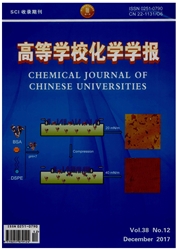

 中文摘要:
中文摘要:
采用全原子分子动力学方法系统研究了聚酰胺(PAMAM)型树形大分子非共价搭载4种抗癌药物分子(CE6,DOX,MTX及SN38)的药物传输复合体系.考察了药物分子种类、数量及树形大分子的代数和聚乙二醇化表面修饰对复合体系的结合强度、尺寸及溶剂中扩散行为的影响.研究发现,PAMAM自身变形能对药物-PAMAM间的结合有重要影响.搭载较多的药物分子可以使PAMAM自身增大,但同样搭载条件下经过聚乙二醇化修饰过的PAMAM变化并不明显.PAMAM分子表面的聚乙二醇化可以更高的强度结合更多的药物分子,并减缓其扩散速度,因而提高药物分子的搭载效率和体内滞留时间.为新型树形大分子基药物传输体系的设计提供理论依据.
 英文摘要:
英文摘要:
We carried out all atomistic molecular dynamics simulations on poly (amidoamine) (PAMAM) den- drimer-based drug-delivery systems where PAMAMs bind non-covalently with four types of anticancer drug molecules including CE6, DOX, MTX, and SN38, respectively. We focus on the study of binding strength, size, and drug diffusion behavior of the complex systems influenced by the number and types of drug molecules as well as the generation (G0--G2) and surface PEGlyation of PAMAM. The simulations show that the deformation of PAMAMs themselves contributes significantly to the strength of drug-PAMAM binding. Multiple drug loading expands PAMAM dendrimers significantly but affects barely the sizes of PEGlyated PAMAM. The surface PEGlyation of PAMAM allows encompassing more drug molecules with stronger binding strength, thus increasing the efficiency of drug loading and retention time. This research provides theoretical evidence for designing novel dendrimer-based drug delivery systems.
 同期刊论文项目
同期刊论文项目
 同项目期刊论文
同项目期刊论文
 Pt-Fe catalyst nanoparticles supported on single-wall carbon nanotubes: Direct synthesis and electro
Pt-Fe catalyst nanoparticles supported on single-wall carbon nanotubes: Direct synthesis and electro Synthesis of NiO/carbon shell/single-walled carbon nanotubecomposites as anode materials for lithium
Synthesis of NiO/carbon shell/single-walled carbon nanotubecomposites as anode materials for lithium Electromagnetic and microwave absorbing properties of SmCo coated single-wall carbon nanotubes/NiZn-
Electromagnetic and microwave absorbing properties of SmCo coated single-wall carbon nanotubes/NiZn- Electromagnetic and microwave absorption properties of single-walled carbon nanotubes and CoFe2O4 na
Electromagnetic and microwave absorption properties of single-walled carbon nanotubes and CoFe2O4 na Stability improvement of C8H2and C10H2embedded in poly(vinylalcohol) films with adsorption on gold n
Stability improvement of C8H2and C10H2embedded in poly(vinylalcohol) films with adsorption on gold n Surface-enhanced Raman scattering investigations of C2nH2(n = 4–6)in as-prepared and dried Ag colloi
Surface-enhanced Raman scattering investigations of C2nH2(n = 4–6)in as-prepared and dried Ag colloi 期刊信息
期刊信息
